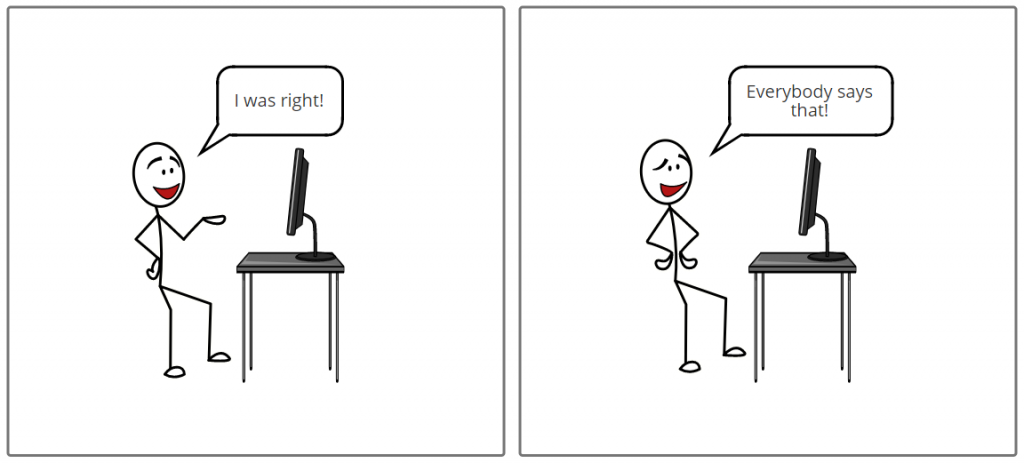
The echo chamber effect is described as blocking out information we do not like. This term comes from the acoustic echo chamber and how sounds vibrate and bounce in a closed space. We put some information to a chamber and then it is amplified or reinforced by communication and repetition within a closed group. And as people we tend to look for opinions that reinforce our existing beliefs.
We struggle with this effect in many everyday situations. We like to meet with like-minded people, invite like-minded people to gatherings and read articles that don’t contradict our opinions. But we should also be aware of the risks that come with the echo chamber effect.
I knew it!
Each day you are exposed to a wide range of various social media. Facebook, Instagram, Twitter, LinkedIn, TikTok – they all give you an opportunity to follow any kind of information, depending your interests and preference for content. But being a part of a group with common interests or related points of view can be dangerous as well.

You may be surprised by such a statement wondering what’s so wrong with that? Let me explain it to you, then. When you associate only with like-minded people, you may become overly confident . As a group member you can take active part in discussions or just passively read responses. After a while you will find your own opinions echoed back to you. Your group will reinforce your existing belief system and make you believe that you’re a know-it-all: “Oh, I was right! I knew it! Everybody says that.”
You can even think proudly to yourself: “Hmm, I’m wise because others confirm my beliefs.” The echo chamber makes you live in your own bubble of information. No matter if the data is true or fake.
Echo chamber lowers critical thinking
Social media groups have a lot of power. People trust the evidence provided by their own social group more than they do when it comes from other media. This can create significant barriers to critical thinking.
It is hard to criticize your colleagues and tell them they are completely wrong when they are members of your group. When it comes to politics, most people are less likely to challenge false rumors about the opposing party. There is a research study [1] conducted by Nicholas DiFonzo, a professor of psychology at the Rochester Institute of Technology, who, along with his colleagues, analyzed the way people behave after hearing a derogatory rumor that contradicts their point of view.
He gathered Republicans and Democrats in separate groups and each group was asked to discuss a rumor about the other party (e.g., “Republicans are uneducated” or “Democrats give less to charity”). As you can expect, when the group consisted of like-minded people, they easily polarized in predictable directions. But when the groups were mixed, it didn’t happen so forcibly. It’s hard to come up with arguments that challenge a group opinion.

This makes group members hear arguments mainly and solely in one direction. Challenging what most people think is right in a group might be considered uncomfortable for many people. Something that requires lots of effort and involves unpleasant quarrels.
Fake news spreads faster than the truth
There is also another quality of fake news. It spreads much faster than the truth [2]. Scientists analyzed true and false news stories distributed on Twitter from 2006 to 2017. The data comprised around 126,000 stories tweeted by 3 million people. The trustworthiness of those news stories was measured by six independent fact-checking organizations that exhibited 95 to 98% agreement on the classifications.
The result proved that fake news spread significantly further, faster, deeper, and more broadly than the truth in all categories of information.
“The top 1% of false news cascades diffused to between 1,000 and 100,000 people, whereas the truth rarely diffused to more than 1,000 people.”
And it didn’t matter whether this was a political news story, an urban legend or a piece of financial information. When it comes to its range, fakes are more powerful than legitimate news.
Why do we love echo chambers?
We have a tendency to seek confirmation of our own beliefs and “unfriend” anyone, whose viewpoints we don’t agree with. We are also blinded by the lure of being in a social clique. It’s just so pleasant to hear somebody say that you are totally right about something.
There is also an element of freedom to it. People, who are inside an echo chamber, are often eager to participate in discussions and share even the most controversial insights. It is because they feel secure. They know that their opinions will be approved by other members. That kind of gratification is tempting. Who wouldn’t like to share an opinion all the while knowing it won’t be met with discontent or criticism?
Conclusion
This article is not meant to show you how evil social media is or that it blocks out diverse information from you. No, social media isn’t an echo chamber, you are. You are exposed to a variety of opinions and sources, but the problem is that people tend to choose mainly the one that confirms their beliefs. And that can prevent you from making logical decisions and improving yourself.
I believe that it’s sometimes good for us to put ourselves in someone else’s shoes and look at the same topic from a different perspective. To discuss topics not only with proponents but also with opponents. Just to broaden our knowledge and make sure our decisions are based on logical arguments, not emotions.
References
[1] Difonzo, Nicholas & Suls, Jerry & Beckstead, Jason & Bourgeois, Martin & Homan, Christopher & Brougher, Samuel & Younge, Andrew & Schwab, Nicholas. (2014). Network Structure Moderates Intergroup Differentiation of Stereotyped Rumors. Social Cognition. 32. 409-448. 10.1521/soco.2014.32.5.409.
[2] Vosoughi, Soroush & Roy, Deb & Aral, Sinan. (2018). The spread of true and false news online. Science. 359. 1146-1151. 10.1126/science.aap9559.